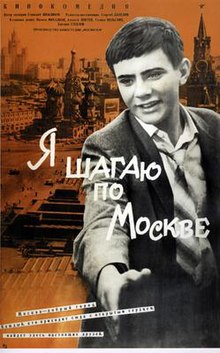Walking the Streets of Moscow
| Walking the Streets of Moscow | |
|---|---|
 Nikita Mikhalkov on the 1964 film poster. | |
| Directed by | Georgiy Daneliya |
| Written by | Gennady Shpalikov |
| Starring | Nikita Mikhalkov Alexei Loktev Evgeniy Steblov |
| Cinematography | Vadim Yusov |
| Music by | Andrei Petrov |
Production company | |
Release date | 1963 |
Running time | 78 minutes |
| Country | Soviet Union |
| Language | Russian |
Walking the Streets of Moscow (Template:Lang-ru, [Ya shagayu po Moskve] Error: {{Transliteration}}: missing language / script code (help)) is a 1963 Soviet film directed by Georgiy Daneliya and produced by Mosfilm studios. It stars Nikita Mikhalkov, Alexei Loktev, Evgeniy Steblov and Galina Polskikh. The film also features cameos by four People's Artists of the USSR: Rolan Bykov, Vladimir Basov, Lev Durov, and Inna Churikova. The famous movie theme, performed by Mikhalkov, was written by the composer Andrei Petrov. The film, regarded as one of the most characteristic of the Khrushchev Thaw, premiered at the 1964 Cannes Film Festival and won a prize for the work of cameraman,[1] Vadim Yusov, best known for his subsequent collaboration with Andrei Tarkovsky.
Plot summary
The film opens at a Moscow airport in summer 1963. A young man, Volodya (Alexei Loktev), calls out to a young woman he sees singing to herself and dancing.
- – Arriving or departing?
- – Waiting for arrivals.
- – Who is it?
- – My husband.
- – He's lucky to have someone to meet him.
- – Get married, you'll have someone as well.
- – And you are both happy?
- – Yes, we are.
- – It never happens.
- – Believe me, it happens.
Volodya is an aspiring writer from Siberia. His first short story has just been published in the magazine Yunost ("Youth"), and a famous author, Voronin, has invited him to Moscow to discuss his work. In the Moscow Metro Volodya unexpectedly makes a friend, Kolya (Nikita Mikhalkov), who is returning home after a hard night shift. Volodya wants to stay at his old friends' home, but he doesn't know where the necessary street is so Kolya decided to help him to find it.
Unfortunately, a dog bites Volodya near Clean Ponds. Then Kolya decided to help his new friend again - they both came to Kolya's home where Kolya sews Volodya's trousers and introduces him to Kolya's large family. Volodya recognised that his old Moscow friends aren't in Moscow (they left for south) and Volodya stays at Kolya's. Then Volodya goes for a walk.
At last alone, Kolya decided to sleep, but then came his old friend Sasha (Evgeny Steblov). Sasha is in trouble - he was planning on marrying his fiancée Sveta today, but he has been called up for military service. He begs Kolya to help him. Kolya helps. Then two young men go to the Main Department Store to buy a suit for a bridegroom and they meet Volodya there (Volody has recently bought a new suit for himself). Then friends decided to buy a present for a bride and they go to the music shop, because the saleswoman, Alyona (Galina Polskikh) is an old friend of Kolya...
Cast
- Aleksei Loktev as Volodya
- Nikita Mikhalkov as Kolka
- Galina Polskikh as Alyona
- Yevgeni Steblov as Sasha
- I. Titova as Sveta
- Irina Miroshnichenko as Katya, Kolka's sister
- Lyubov Sokolova as Kolka's mother
- Yekaterina Melnikova as Kolka's grandmother
- Arkadiy Smirnov as Aleksey Petrovich Voronov, writer
- Vladimir Basov as floor polisher
- Rolan Bykov as Man in Park
- Valentina Ananina as ice-cream vendor
- Veronika Vasilyeva as mistress of ceremonies
- Irina Skobtseva as "Nadya"
- Marya Vinogradova as woman with a dog
- Gennadiy Yalovich as tour-guide
- Alevtina Rumiantseva as underground guard
- Vladimir Shurupov as Viktor, Kolka's brother
- Danuta Stolyarskaya as Anya, Viktor's wife
- Boris Balakin as taxi driver
- Boris Bityukov as Alyona's father
- Pyotr Dolzhanov as passerby
- Lev Durov as militsioner
- Arina Aleynikova as girl at the airport
- Igor Bogolybov as military commissar
- Vadim Shilov as underground squabbler
- Anna Pavlova as secretary at the military commissariat
- Viktor Volkov as construction foreman
- Viktor Shkurin as thief
- Uno Masaaki as Japanese man
- Svetlana Besedina as girl in the rain
- Oleg Vidov as boy on the bike
- Lyubov Sokolova as girl who won the drawing competition
Legacy
This film was highly beloved by Soviet youth in the early 1960s. Though its plot is a bit naive and unpretentious, it showed how wonderful life was, gives hope and tries to look at the unpleasant things in an optimistic way. The song by the same name from the film is still popular and became the unofficial hymn of Moscow youth.
The popularity of this film was low in the 1970s but rose again in the 1980s in contrast to contemporaneous "chernukha" ("black") films, gloomy satirical and social dramas with philosophical motifs. Nowadays it is still very famous.
There are new versions of the song by some 1990s Russian rock groups (for example, Nogu Svelo!) and also attempts at film remakes The Heat, which were unsuccessful.
References
This article needs additional citations for verification. (April 2010) |
- ^ "Festival de Cannes: I Step Through Moscow". festival-cannes.com. Retrieved 2009-03-01.
